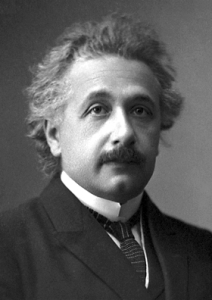I came across a great article from the New Yorker with an interesting title. In fact, my interest lasted all the way to the end.
Spooked: What do we learn about science from a controversy in physics?

If you get the feeling that science is not as pure of thought and logic as it pretends to be, then you will find some comfort in Adam Gopnik’s approachable review of the deeply hidden controversy surrounding what Albert Einstein called “spooky action at a distance.” Spooky action is the weirdest of all science, and makes telepathy and clairvoyance seem almost banal by comparison.
In my opinion, parts of Gopnik’s none-too-technical article remind me of the quote by Dr. Jason Parker, the protagonist in the science fiction thriller, “Middle Waters“. In a supposed speech to the open-minded Emerald Path Society, Parker said, “There are regions between heaven and Earth where magic seems real and reality blurs with the surreal. It is a place where things move quickly and darkly, be they friend or foe. The hard part for me is knowing the difference between them.”
Gopnik expressed that thought more prosaically by the following: “”Magical” explanations, like spooky action, are constantly being revived and rebuffed, until, at last, they are reinterpreted and accepted. Instead of a neat line between science and magic, then, we see a jumpy, shifting boundary that keeps getting redrawn.”
Gopnik goes on to say, “Real-world demarcations between science and magic … are … made on the move and as much a trap as a teaching aid.”
To be honest, I did leave out Gopnik’s entertaining reference to Bugs Bunny and Yosemite Sam. Again, if you have ever been suspicious of the purity of science, the New Yorker article is well worth the read.
Unlike the concerns of Einstein, Neils Bohr and the rest of the cast of early 20th century physicists, the anxiety of Jason Parker, the fictional hero, is not cosmological; it’s personal. It’s every bit as personal as it is for each of us when we sometimes question our sanity.
Yes, real life can be like that sometimes, when things intrude into our ordered lives, as quickly as a Midwest tornado, but with less fanfare and warning. But every bit as destructive. And it is at those points, those juxtapositions with things radical, unexpected, that we end up questioning our grip on reality.
After all, what could be more unexpected and unreal seeming than the notion that cosmological matter we can’t see, dark matter, could send comets crashing into the Earth, as Gopnik mentioned, and the Harvard theoretical physicist Lisa Randall wrote about in her book Dark Matter and the Dinosaurs.
So, Jason Parker had every reason to be wary of things that move quickly and darkly. They can be a killer.
Sometimes, as in the case of Parker, those internal reflections do end up having a cosmological consequence. But even if they don’t, it’s a good idea to occasionally reexamine our lives for the things which may seem one day to be magical, and the next day to be very real.
In short, the magic should not be dismissed out of hand, because, after all, just like “spooky action at a distance” and “dark matter”, it may not be magic after all.















